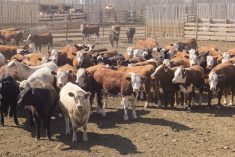U.S. drugmaker Merck and Co. said on Friday it is temporarily suspending sales of its Zilmax animal feed additive in the U.S. and Canada following concerns about use of the product, which is given to cattle to increase their weight before slaughter.
Zilmax has been the focus of attention in the livestock industry since Tyson Foods Inc announced last week it will no longer accept Zilmax-fed cattle for slaughter.
Reuters reported earlier this week that a second major meat packer, JBS USA, at a cattle industry conference had presented a video from a JBS plant showing cattle having difficulty walking after they were fed beta-agonist drugs, additives that speed weight gain in animals. Zilmax is the leading commercial brand of beta-agonist.
Read Also

U.S. livestock: Feeder cattle hit contract highs on tight supply
Chicago | Reuters – All Chicago Mercantile Exchange feeder cattle futures and most live cattle futures hit contract highs on…
Merck said its decision will allow the company time to implement its plan announced on Tuesday to establish study protocols, identify feeders and packers to participate in its audit while creating a third-party team to oversee the process and validate its results.
Merck said on Friday it remains confident in the safety of the product, which had sales of $159 million last year in the U.S. and Canada. But the company added it will conduct an audit of how it is used “from the feedyard to the packing plant.” The product is sold in the U.S. by Merck Animal Health and in Canada by Intervet.
Also on Friday, the U.S. Food and Drug Administration said it was working with Merck and the U.S. Department of Agriculture to gather information on Zilmax and determine if it poses a safety issue.
Livestock analysts said they were surprised by Merck’s decision because the company’s earlier move to address concerns about Zilmax had not included a sales halt.
“They laid out a strategy in the last few days that did not include suspension,” said Jim Robb, director of the Livestock Marketing Information Center.
“Up in the air”
The halt in sales will not cause a major disruption in North American beef production if producers switch to Optaflexx, a less-potent growth promoter sold by Eli Lilly’s Elanco animal health unit, Robb said.
“It’s up in the air and it depends on the producers’ response,” he said. “That’s unfolding even as we speak.”
The use of Zilmax drew increased scrutiny after Tyson said on Aug. 7 it would stop purchases of cattle fed the popular feed additive after some animals arrived at its packing plants having difficulty walking or moving.
Tyson, the country’s biggest meat processor, said it does not know what was behind the animals’ behaviour, but company executives said that animal health experts have suggested that the use of Zilmax may be a cause.
One of Tyson’s rivals, Cargill, the country’s third-largest meat producer, called Merck’s decision to halt sales “prudent” and said it reflects a “thorough assessment of the situation.”
“While Cargill has not experienced some of the cattle well-being issues others have, we support Merck’s decision,” Cargill spokesman Mike Martin said. Cargill will continue to buy cattle fed Optaflexx, he added.
Major beef packers National Beef and JBS USA could not immediately be reached for comment.
“We appreciate Merck’s decision and will continue to monitor this issue,” Tyson spokesman Gary Mickelson said Friday. “We’ll also continue to seek input from our Animal Well-Being Advisory Panel as well as other independent animal health and welfare experts.”
Following Tyson’s decision to stop buying cattle fed with Zilmax, Merck defended its product. The drug company said in a statement on Friday that tests have proven that Zilmax is safe. Merck also said it was working with Tyson to resolve questions about the drug.
Following Tyson’s decision to stop buying cattle fed with Zilmax, Merck defended its product. The drug company said in a statement on Friday that tests have proven that Zilmax is safe. Merck also said it was working with Tyson to resolve questions about the drug.
“Perhaps now Merck’s got some data in their files somewhere where they realize maybe this is a problem,” said Rich Nelson, chief strategist for commodities brokerage firm Allendale Inc.
The halt of Zilmax sales may translate into a one per cent drop in U.S. beef production, Nelson said.
Feedlots will shift to rival additive Optaflexx from Zilmax because they still want to add weight to their animals, Nelson said.
Optaflexx is considered less effective at adding weight to animals than Zilmax, according to producers. Optaflexx’s active ingredient is ractopamine, another well-known beta-agonist found also in Paylean, an Elanco feed additive for hogs.
“We’re not going to see feedlots go from Zilmax down to nothing,” Nelson said.
— Theopolis Waters and Tom Polansek report for Reuters from Chicago. Includes files from AGCanada.com Network staff.
Related stories:
Tyson to suspend buying cattle fed Zilmax, Aug. 8, 2013
Russia chops Canadian meat supplier list to 19 plants, April 16, 2013















